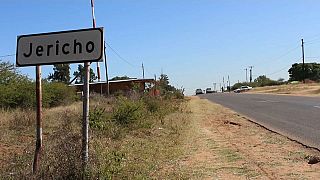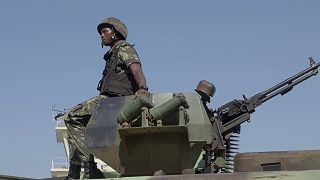Mozambique
Jihadist attacks in Palma In the Cabo Delgado region of Mozambique which -- according to recently collected data by the United States conflict tracker ACLED, has claimed over 2,800 with around half being civilians, has also internally displaced numerous people within the country.
These people feeling the conflict are congregating in Pemba. The mass migration is putting a strain on the health system already grappling with the ongoing COVID-19 pandemic.
Emilio Mashant, a medical professional and health programme manager at the International Committee of the Red Cross (ICRC) in Cabo Delgado, appears overwhelmed by the influx of new patients.
"This [managing the Covid-19 pandemic and the influx of displaced people to Cabo Delgado at the same time] is really a nightmare, and to be honest, it's very complicated to resolve these problems because these people are living in very poor conditions.
"Even asking them to buy a mask to protect themselves is a challenge. So the IDPs, okay, the health system, in general, is trying to do its best to protect the people when they arrive at the health facilities."
The region reports low coronavirus infection numbers but other issues such as cholera, malaria coupled with the influx of new arrivals overcrowd health centres and burn out staff.
Laurinda Zeca, Chief of Ingonane Health Centre, shares her insight on the health situation.
"The challenge is really to have, even the health workers, we need more. At the moment, we're nine, we need more because now the influence is greater. We are receiving many people, in these weeks, we need more health workers and facilities. We are [currently] not offering complete services.
"Look, before, the health centre had a bigger challenge. We didn't have facilities, it's true. But it (the challenges) has been increasing, because of the refugees, so at this moment with the refugees, we see we have many difficulties, sometimes we'll join the services."
The International Committee of the Red Cross (ICRC) and medical workers are seeking to expand and upgrade the medical infrastructure in Mozambique -- recently erecting a clinic in Pemba's Ingonane township.
Raoul Bittel, ICRC head of operations in Pemba, explains the current state of affairs.
"If you look at what happened last year and this year, is we have a roughly seven-fold increase of people who have fled from northern districts, from one hundred to roughly seven hundred thousand. So obviously, this puts a lot of strain on existing infrastructure: health, education, everything."
- Kindness and Solidarity -
A year ago Atija Camacho lived with her husband and their ten children in a small three-roomed house in Paquitequete, a poor seaside neighbourhood in Mozambique's Pemba city.
Today, more than 40 people reside in her home.
As a jihadist insurgency escalated last year, Camacho offered shelter to more than 30 persons she found destitute at a nearby beach where dozens arrive almost daily in rickety vessels, fleeing the violence up north.
More than 700,000 people have abandoned their homes since the violence started three-and-half years ago — 64,000 of them in just the last two months since a major attack on Palma town.
At least eight in ten displaced Mozambicans move in with family, friends or strangers. The statistic is according to humanitarian aid agencies.
On arrival in Pemba, the capital of Cabo Delgado province, the displaced people look for relatives or just stay on the beach, waiting for the government to move them to temporary shelters — a process that can take days.
"I saw some people still at the beach, in the open. I felt sorry for them," said the soft-spoken Camacho, 35, explaining how she ended up with the crowd staying under her roof.
A few metres away across the sandy yard of the house, one of her "guests", Awa Njane, 19, sat on a small stool preparing dinner on an open coal fire.
Njane fled Quissanga in October after her father was captured by militants and beheaded. She does not know the whereabouts of her husband or mother.
— 'Hunger on the rise' —
She is profusely thankful to Camacho, her new "mother" who gave shelter to her and her baby son, then a month old, after they slept rough for a week at the dirty beach.
Frying small pieces of sardines, far from enough to feed the 43 people in Camacho's household, she said, "It's very difficult to get food."
The insurgency has pushed many to the brink.
"Hunger is on the rise in Cabo Delgado," Pierre Lucas, World Food Programme (WFP) chief in Mozambique, told AFP.
"Displaced people are in urgent need of assistance now and for the next following months," he said, appealing for $104 million (85.3 million euros) in funding to feed 950,000 people — the displaced as well as their host families — until the year end.
Lucas added that "83%of (internally displaced people) are living with host families and the pressure is increasing on these communities."
Camacho has added three extra rooms to accommodate her guests, but that is still not enough.
"People sleep everywhere, including here," she said, pointing at the veranda of her house — measuring barely 40 square metres and built with metal sheets and bamboo plastered with mud.
- Health Mobilisation -
The UN International Organization for Migration (IOM) is on the frontline, receiving heavily traumatised survivors. Its staff offer mental health care not only for the displaced but also for their hosts — some of whom even struggle to look after themselves.
"Host communities have very limited resources. In spite of that, they are happy to share. There is a sense of humanity that unites them," said IOM's mental health expert in Pemba, Derya Ferhat.
"That is an amazing thing about Mozambicans, they are very generous," she added. "People are really happy to support each other."
Nevertheless, pressure from the mass displacements is felt across the board and the health care systems are also buckling under the strain.
Adriano Nuvunga, head of Mozambique's Centre for Democracy and Development, blames "governance failure" for the huge numbers of people living off host families.
"The state is failing, and that is fuelling the feeling of hopelessness among the displaced," Nuvunga said, adding that despair makes people vulnerable to recruitment into the ranks of the extremists, who have made links with the Islamic State group.











Go to video
In Kenya, 90% of packaged food needs health warning label under new rules
01:02
WHO member countries draft landmark preparedness treaty for next pandemic
Go to video
At least 300 people killed during the post-election violence in Mozambique
01:00
Italy airlifts nine Palestinian children from Gaza for life-saving treatment
02:42
Global healthcare at a crossroads: African scientists seek local solutions
Go to video
Niger: At least 10 soldiers killed in an ambush